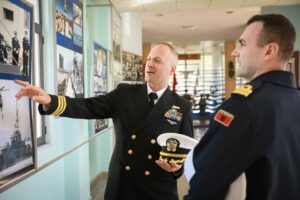At the State Department, the strategic dialogue between the government of the United States and the Albanian government is currently underway. Representatives from a number of government institutions take part in the meeting between the two governments.
The Deputy Assistant Secretary of State for Europe and Eurasia, Gabriel Escobar, who covers the American policy for the Western Balkans, shortly before the start of the meeting, talked with the Head of the Albanian Service of the Voice of America, Arben Xixho, about bilateral relations and the state of democracy. in Albania.
VOA: Mr. Escobar, what are the main issues that will be discussed in today’s strategic dialogue between the United States and Albania.
Deputy Assistant Secretary Escobar: I would say everything related to bilateral relations. This is the most important meeting between representatives of the United States and representatives of Albania in modern history. We will have representatives from the Department of State, the Department of Defense, the Department of Commerce, the International Development Finance Corporation, as well as other government agencies to find ways to deepen strategic cooperation. In recent years, Albania has become a very reliable partner for the United States. Albania plays an important role for regional and European stability. Now that Albania is a member of the UN Security Council, the country has become a factor of global stability. So it is important that we continue to coordinate our positions.
Voice of America: One of the sectors in which the United States has been very engaged in Albania, is that of energy. What are the expectations for this sector?
Deputy Assistant Secretary Escobar: Albania is turning into an important energy center. Now that Europe is facing challenges in the energy sector, we want to find ways of cooperation with Albania to help alleviate these problems. We are convinced that we can find ways and ways where America can help to invest in the energy infrastructure in Albania to realize this goal.
VOA: The United States supported Albania after Iran’s cyber attacks on its infrastructure and offered to help it. What concrete help is it about?
Deputy Assistant Secretary Escobar: This will be part of today’s discussions and I hope that by the end of the day, we will have an agreement on the type of assistance that we will provide; I expect the help to be both technical and financial, to support the cyber security sector in Albania.
VOA: You said today’s meeting will cover a wide range of issues. As we know Albania is a country plagued by corruption and recently the government announced an initiative for a wide fiscal amnesty, up to 2 million dollars. There have been concerns from the IMF, the World Bank, or the European Union, that this could be used for money laundering. Does the United States share the same concerns?
Deputy Assistant Secretary Escobar: Yes, we also have some concerns. We have discussed them with the government of Albania. I would call on the government of Albania to listen to these voices and adapt the approach to fiscal amnesty to be in line with global standards and EU requirements.
Voice of America: Do you have a clearer position on whether this initiative should be implemented or abandoned?
Deputy Assistant Secretary Escobar: I don’t want to get into the essence of the discussions we will have with the Albanian officials today, but we will have an open dialogue about what the consequences would be.
Voice of America: In Albania, there have been objections and criticisms towards the European Union and the United States, as architects of the justice reform, especially from the opposition, criticizing the United States for interfering in Albania’s internal affairs. But recently we have also seen a new element, the Prime Minister of Albania Edi Rama in a speech of the last few days said, although he did not mention her by name, but it was understood that he was talking about the American ambassador, where he stated that “some foreign ambassadors feel at home in our courts and have the luxury of publicly sharing their approval or disapproval with court decisions.” What is your reaction?
Deputy Assistant Secretary Escobar: What our ambassador does there is very beneficial for Albania. She is the point person for bilateral relations. Everything she does is in very close cooperation with the State Department. These are not individual attitudes, they are institutional attitudes. And I must emphasize that issues of corruption, issues of organized crime, have affected the entire region, not only Slovenia, so it is important to cooperate to counter these threats.
Voice of America: I also want to ask you about the status of democracy in Albania. The opposition is in a disorganized state after the declaration of non-grata of the former President Sali Berisha. The decision revived him, he leads the party today, or at least the majority of the party. It can be argued that the decision against him, in a way, had the opposite effect, especially considering that it was not accompanied by the raising of charges by the justice bodies. How do such decisions help the fight against corruption in Albania?
Deputy Assistant Secretary Escobar: The decision to define it was an institutional decision. It was not an individual decision and it was not a political decision. It was a decision we made because of the corruption we found. I would call on the institutions in Albania to examine this. But I want to say that we still have good partners in the Democratic Party, we want the Democratic Party to be a strong and important contributor to political stability in Albania. I would call on the supporters of the Democratic Party to think about the image they convey, if they were to have people in charge who have been determined by the Secretary of State for corruption.
Voice of America: Would you like to add something else about Albania.
Deputy Assistant Secretary Escobar: I wanted to thank the government of Albania for the partnership and the people of Albania for their friendship. Today’s one-day meeting is a symbol not only of cooperation between governments, but also of deep friendship between the American people and the Albanian people.








